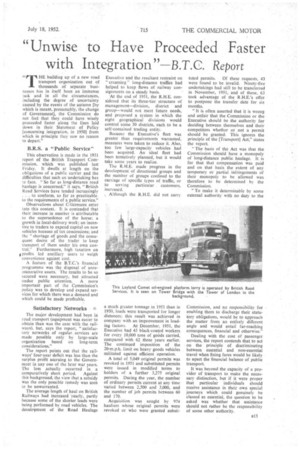"Unwise to Have Proceeded Faster
Page 49

If you've noticed an error in this article please click here to report it so we can fix it.
with Integration"—B.T.C. Report
" HE building up of a new road transport organization out of thousands of separate businesses has in itself been an immense task and in all the circumstances, including the degree of uncertainty caused by the eyents of the autumn [by which is meant, presumably, the change of Government], the Commission do not feel-that they could have wisely proceeded faster along the lines laid down in their Statement of Policy [concerning integration, in 1950] from which in principle they saw no reason to depart."
B.R.S. a "Public Service"
This observation is made in the 1951 report of the British Transport Commission, which was published last Friday. It dwells at length on the obligations of a public carrier and the difficulties that such an undertaking has to face. "So far as long-distance road haulage is concerned," it says, "British Road Services have tended increasingly . . . to conform, so far as practicable, to the requirements of a public service."
Observations about C-licensees enter into this context. It is contended that their increase in number is attributable to the supersedence of the horse; a growth in local-delivery work; an incentive to traders to expend capital on new vehicles because of tax concessions; and the "shortage of goods and the consequent desire of the trader to keep transport of them under his own control." Furthermore, high taxation on *profits led ancillary users to weigh convenience against cost.
A feature of the B.T.C.'s financial programme was the disposal of unremunerative assets. The results to be so secured were necessary, but attracted undue public attention. A more important part of the Commission's policy was to develop and expand services for which there was a demand and which could be made profitable.
Satisfactory Networks *
The major development had been in road transport (equipment was easier to obtain than was the ease with the railways), but, says the report, "satisfactory networks of regular services are made possible only by large-scale organization based on long-term considerations."
The report points out that the railways' four-year deficit was less than the surplus profit accruing to the Government in any one of the later war years. The loss actually occurred in a comparatively short period. Against this background, the view that a subsidy was the only possible remedy was seen to be unwarranted.
The average length of haul on British Railways had increased yearly, partly because some of the shorter leads were being performed by road vehicles. The development of the Road Haulage Executive and the resultant restraint on " creaming " long-distance traffics had helped to keep flows of railway consignments on a steady basis.
At the end of 1951, the R.H.E. considered that its three-tier structure of management—division, district and group—would not meet future needs, and proposed a system in which the eight geographical divisions would control some 50 districts, each to be a self-contained trading entity.
Because the Executive's fleet was greater than requirements warranted, measures were taken to reduce it. Also, too few large-capacity vehicles had been acquired. An ideal fleet had been tentatively planned, but it would take some years to realize.
The R.H.E. made progress in the development of directional groups and the number of groups confined to the carriage of specific types of traffic, or to serving particular customers, increased.
„ Although the R.H.E. did not carry a much greater tonnage in 1951 than in 1950, loads were transported for longer distances; this result was achieved in company with an improvement in load ing factors. At December, 1951, the Executive had 45 black-coated workers for every 10,000 tons of goOds carried, compared with 62 three years earlier. The continued imposition of the 20-mph. limit on heavy goods vehicles militated against efficient operation.
A total of 5,049 original permits was revoked in 1951 and substituted permits were issued in modified terms to holders of a further 3,275 original permits. During the year, the number of ordinary permits current at any time varied between 2,500 and 3,000, and the number of job permits between 60 and 170.
Acquisition was sought by 974 hauliers whose original permits were revoked or who were granted substi
tuted permits. Of these requests, 43 were found to be invalid. Ninety-five undertakings had still to be transferred in November, 1951, and of these, 63 took advantage of the R.H.E.'s offer to postpone the transfer date for six months.
"It is often asserted that it is wrong and unfair that the Commission or the Executive should be the authority for deciding between themselves and their competitors whether or not a permit should be granted. This ignores the principle of the [Transport] Act," states the report.
"The basis of the Act was that the Commission should have a monopoly of long-distance public haulage. It is for that that compensation was paid and on that basis the extent of any temporary or partial infringements of their monopoly to be allowed was therefore to be determined by the Commission.
"To make it determinable by some external authority with no duty to the Commission, and no responsibility for enabling them to discharge their statutory obligations, would be to approach the matter from an entirely different angle and would entail far-reaching consequences, financial and otherwise."
Dealing with the cost of passenger services, the report contends that to act on the principle of discriminating between essential and non-essential travel when fixing fares would be likely to upset the financial balance of public transport.
It was beyond the capacity of a provider of transport to make the necessary distinction, but if it were proper that particular individuals should receive assistance in their own special journeys which could genuinely be classed as essential, the question to be asked was whether that assistance should not rather be the responsibility of some other authority.




























































































